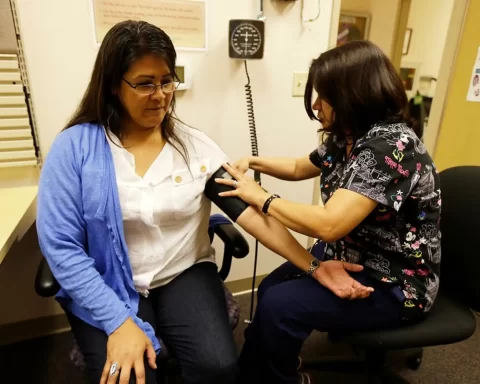New Delhi, Sep 15: Research has suggested that eating more potassium rich foods, such as avocados, bananas and salmon, can help counter the damaging effects of too much salt.
People who had the most potassium in their diet were 13 per cent less likely to have a heart attack or stroke than people who consumed the least, according to research published in the European Heart Journal.
The study also found that potassium-rich diets were linked with having lower blood pressure in women who eat a lot of salt.
Previous research has already shown that eating more salt is linked with having higher blood pressure and a high risk of heart attacks and strokes, while eating more potassium-rich foods has been linked with having lower blood pressure and a lower risk of heart attacks and strokes.
This research was trying to find out whether there is a difference in the way potassium affects men and women’s heart health. They also wanted to see if the benefits of a potassium-rich diet differed depending on how much salt you eat. Potassium increases the amount of salt that your body removes from the bloodstream (via your wee), so in theory more potassium might benefit people whose health would otherwise be at risk because they eat more salt.
Past studies have suggested that women’s blood pressure is more sensitive to differences in salt intake, so the researchers were testing the theory that women might have more to gain from increasing the amount of potassium in their diet.
Potassium rich foods
- Chicken (average roasted meat, 174g) 574mg
- Banana (one) 330mg
- Avocado (half) 360mg
- Broccoli (raw, 80g) 317mg
- Spinach (80g) 545mg
- Cooked salmon (154g piece) 634mg
- Potato (one medium portion, boiled, 175g) 639mg
- Skimmed milk (1/3pint/195g) 316mg
What is potassium?
Potassium is a mineral that is essential for all of the body’s functions. It helps your nerves, muscles and heart to function well, and also helps move nutrients and waste around your body’s cells.
What does potassium do?
Potassium has many important functions:
- It allows the nerves to respond to stimulation and muscles to contract (tighten), including those in the heart.
- It reduces the effect of sodium (present in table salt) on blood pressure.
- It helps move nutrients into cells, and waste products out of cells.
Having the right amount of potassium helps:
- Control blood pressure
- Protect against strokes and cardiovascular disease
- Protect against osteoporosis
- Prevent kidney stones
Your kidneys control potassium levels in your body and get rid of excess potassium in urine. If your kidneys do not work properly, potassium may build up in your blood. This can be a very dangerous condition, because it may cause your heart to beat irregularly or stop beating (cardiac arrest).
Can I have too much or too little potassium?
The amount of potassium in the body is affected by:
- The climate
- Your level of physical activity
- Using diuretic medicines (water tablets)
- How much sodium you consume (linked to how much table salt you use in food)
- An imbalance of potassium can lead to health problems.
Low potassium
Low potassium (hypokalaemia) can lead to symptoms including:
- Weakness and tiredness
- Muscle cramps
- Constipation
- Abnormal heart rhythms (arrhythmias)
There are many causes of hypokalaemia. Common causes include taking diuretics (fluid tablets) and dehydration, for example due to vomiting, diarrhoea or excessive sweating.
Occasionally, people may have low potassium because they don’t eat enough foods high in potassium.
High potassium
A high potassium (hyperkalaemia) is a serious and potentially life-threatening condition. Your doctor might discover you have high potassium through blood tests you had to explain or monitor another condition.
If you have unusually high levels of potassium, you may feel weak and tired, feel nauseous and have an abnormal heart rhythm.
Hyperkalaemia has many possible causes. Most commonly, it is caused by kidney disease or taking medicines that decrease the amount of potassium the body removes via the kidneys.
If you have these symptoms and believe your potassium levels might be high, contact your doctor immediately. They can check your potassium levels with a blood test.
How much potassium do I need?
How much potassium you need depends on your age, sex and stage of life:
| Stage of life | Adequate intake for potassium (milligrams per day) |
|---|---|
| 0 to 6 months | 400 mg/day |
| 7 to 12 months | 700 mg/day |
| 1 to 3 years | 2,000 mg/day |
| 4 to 8 years | 2,300 mg/day |
| 9 to 13 years | |
| Males | 3,000 mg/day |
| Females | 2,500 mg/day |
| 14 to 18 years | |
| Males | 3,600 mg/day |
| Females | 2,600 mg/day |
| Adult men | 3,800 mg/day |
| Adult women | 2,800 mg/day |
| During pregnancy | 2,800 mg/day |
| While breastfeeding | 3,200 mg/day |
Because having too much potassium can affect your health, only take a potassium supplement if your doctor prescribes one. Babies under 12 months can get all the potassium they need from breast milk, formula and food.





